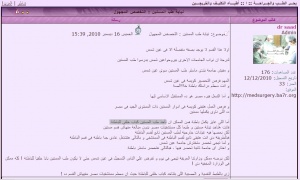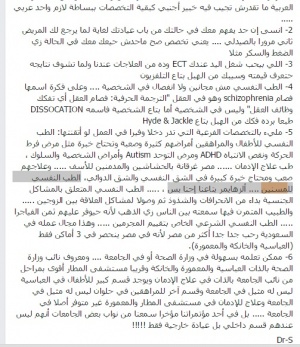إشكالية تخصص طب المسنين
إشكالية تخصص طب المسنين هي قضية هامة جداً في رعاية المسنين.
محتويات
لماذا طب المسنين
إختراع العجلة مرة أخرى
فوائد مرجوة
- Grey nomads
- bed blockers
- dementia in slang
- revolving door policy
- streamlining
- transational care
- سلسلة الرعاية
- CGA
- international space station
أضرار محتملة
إحصائات
أطباء الباطنة في إنجلترا حوالي ؟70%؟ منهم حاصلين على دبلوم طب مسنين وربما عدد أكبر حاصل على شهادة تخصصية في طب المسنين.
نيابة طب المسنين في وزارة الصحة المصرية
للتعلم والإعتبار وليس نشر للملابس المتسخة لتفادي الوقوع في نفس الأخطاء ولتحقيق الأهداف المرجوة التسرب عن طريق أخذ نيابة طب مسنين كباب خلفي للتسجيل في تخصص الباطنة (إقتداءاً بتخصص الطب النفسي في مستشفيات الوزارة[1])
مؤتمرات سنوية لكليات الطب في مصر
أدركت العديد من كليات الطب في مصر في العديد من الجامعات أهمية تخصص طب المسنين وقامت بتخصصيص أحد مؤتمراتها السنوية لتناول مواضيعه (مثل عين شمس وطنطا والأزهر وقناة السويس). ولكن لأسباب متعددة لم تنجح محاولات إنشاء التخصص في بعضها ولكن نجحت في البعض الأخر (عين شمس - المنصورة - قناة السويس).
مخاوف غير مبررة وتساؤلات إجابتها سهلة
- طول مدة الإقامة
- عدم تفهم إدارة المستشفى: لا يوجد تمريض - لا يوجد أطباء - لا يوجد أسرة - لا يوجد ميزانية - لا يوجد سياسات
- عدم إقبال الأطباء
- عدم فهم المرضى
- عبء ومسئولية تقديم الرعاية الطبية للمسنين
- لا يوجد مسار مهني ومستقبله غامض في القطاع الحكومي والخاص وخارج مصر
- لا يوجد إعتماد من النقابة والترخيص للعيادة
- الوصمة من الزملاء والعاملين في القطاع الصحي والمرضى والمجتمع
- العائد المادي غير مجدي مقابل المجهود المبذول
- لا يوجد تأهيل كافي
- من هو المسن؟
- لا يوجد فارق بين المسنين والفئات الأخرى
- التداخل مع التخصصات الأخرى وعدم وجود حدود للإحالة
- ما سمعنا بهذا من قبل
- لا يوجد تمريض
- لا يوجد رعاية منزلية
- لا نستطيع قلبها دار مسنين
- يوجد نقص في توافر أسرة الرعاية المركزة
- المشاكل النفسية متعددة وصعبة (الدمنشيا - الإكتئاب - الجسمنة)
- لا توجد فائدة الشيخوخة ستحدث لا محالة
- إذا حصل الشباب على حقوقهم الصحية
- الأفضل عدم عزلهم في تخصص واحد
- تخصص المسنين لا يوجد له برامج دراسات عليا
- تخصص المسنين هو صحة عامة
- مشاكلهم كثيرة (قرح فراش - عدوى مقاومة للمضادات الحيوية)
- عبء في صرف الأدوية
- مشاكل قانونية (السقطات والكسور - الوفيات - المراضةMorbidity - الورثة - إختلاف متخذي القرار الصحي - الإساءة للمسنين)
- توجد أزمة رعاة والعقوق زاد في المجتمعات
- طب مسنين أم طب وصحة المسنين أم طب شيخوخة أم ماذا؟
Geriatric Medicine Defined
http://www.bgs.org.uk/index.php/228-about/administration/981-geriatricsdefined
Created on 29 September 2010 The Royal College of Physicians (London) describes Geriatric Medicine as follows:
Geriatrics is a branch of General medicine that is concerned with the clinical, preventative, remedial and social aspects of illness in old age. The challenges of frailty, complex co-morbidity, different patterns of disease presentation, slower response to treatment and requirements for social support call for special medical skills.
Presentations of illness in old age are often non-specific: Geriatricians focus on falls, immobility, incontinence and confusion as well as adverse drug reactions. We see a broad range of illnesses, particularly stroke, heart disease, infections, diabetes, delirium, and the dementias. Some Geriatricians deal with the whole range of Geriatric problems, particularly those who spend some time working in the community. Others specialise in such areas as Orthopaedic Geriatrics, Stroke, Falls and Syncope, Cerebral ageing, Parkinsonism
At its core, Geriatrics requires comprehensive assessment of ill and disabled old people. This involves close inter-disciplinary working with nurses, therapists, pharmacists, dieticians, social workers and many other health professionals. We work closely with GPs, Old Age Psychiatrists and many hospital clinical specialists to ensure that old people receive the highest possible levels of care
Geriatric Medicine and Geriatricians in Medicine
http://www.bgs.org.uk/index.php/35-sectnews/catnewsflash/2377-bgspositionstatement Created on 01 December 2012
This statement is intended to support Geriatric Medicine departments in allocation of their resources and should be useful in discussions with senior health service managers and commissioners. It will be augmented by several more detailed service descriptions with case examples. It is also a reference point for the BGS in prioritising its work to promote high quality safe, dignified care of older people.
Geriatrics is the branch of general medicine concerned with the clinical, preventative, remedial and social aspects of illness in old age. The challenges of frailty, complex co-morbidity, different patterns of disease presentation, slower response to treatment and requirements for interdisciplinary support call for specialist medical skills. Geriatrics is the medical specialty that provides those specialist skills, as recognised by the GMC. All geriatricians have core general medicine training: most are certified general medicine specialists.
Introduction
The NHS must meet the needs of an ageing population in a challenging social and economic climate. To do so successfully, we must make prudent use of teams specialising in geriatric medicine. Already geriatric medicine departments are stretched. This is partly because of an overall increase in NHS clinical activity. But equally important is the widening scope of their work as the beneficial impact of specialist medical skills in hospital and community healthcare is recognised.
Older People in the Modern NHS
People aged 65+ are ~ 17 % of the population, and use 65% of acute hospital bed-days People aged 65+ comprise more than 50% of surgical patients, more for major surgery People aged 65+ use nearly half the NHS and over half of social services’ budgets Failures of safety, quality and patients’ experience mainly concern older people Older people are the NHS' core activity.
Geriatricians in the acute hospital – the provision of acute medical care
Consultant and trainee geriatricians are key players in running the acute medical “take”. Geriatrics is the largest specialty doing general medicine and providing acute medical care of patients admitted as emergencies. In this role as general physicians, they share with other specialists in Acute/General Medicine the provision of the first 24-48 hours of emergency medical care of adults of all ages. The scope and extent of the geriatrician contribution varies by site and circumstances. In a fully integrated service, all medical specialists act with equivalent responsibilities. But in many hospitals, the ongoing responsibilities are divided by need, geriatricians focusing on the oldest or frailest patients.
Geriatricians have a unique role as the only specialty with a focus on acute illness and rehabilitation of frail older people. The evidence based application of comprehensive geriatric assessment (CGA) is central to this specialist practice. There is strong evidence for specialist units (eg wards) for the post-acute optimization of patients’ recovery, using a multidisciplinary CGA approach.
There is no established “best model” to bring multidisciplinary CGA expertise to all patients who need it at the “front door” and onwards in the acute hospital medical service, but key components are:
Assessment to target individuals into community based services in lieu of hospital admission. Age-attuning acute medical admission units, both the environment and processes of care. Early recognition and response to geriatric syndromes: delirium, falls, immobility, functional loss. Proactive identification of suitable patients for rapid follow up in specialist clinics. End of life care is a core medical skill but geriatricians can be expected to provide expert support. Multidisciplinary rehabilitation and expert discharge planning for patients with complex needs Adequately resourced geriatricians are therefore key to an effective acute medical service.
The wider roles of geriatricians in the acute hospital
Medical problems are the main reason for poor clinical outcomes in surgical patients. Evidence is growing to support proactive medical support for older patients having emergency or elective surgery. Adhoc duty medical support with lack of continuity is inadequate. This is a challenge which must be addressed across all adult specialties and departments, but geriatricians can help:
Geriatricians should provide shared care models with orthopaedic departments for older patients with fragility fractures, particularly hip fractures. Geriatricians can provide expert support to “whole hospital” approaches to geriatric syndromes, and to play leading roles in respect to delirium and dementia complicating acute illness. Proactive involvement of geriatricians in wider surgical services is good for patients. Local arrangements depend on resources available after considering other priorities. Geriatricians in community health services
Geriatricians can provide leadership in shifting the balance of clinical care of frailer older people into the community where that is appropriate. This implies leadership in the development of appropriate community services, and participation as specialist medical staff in those services, in which CGA diagnostic skills are central.
The available evidence supports geriatricians as the effective providers of medical oversight of bed based intermediate care facilities, such as community hospitals. Geriatricians need not assume medical responsibility for domiciliary intermediate care but should provide leadership to service design, performance review and clinical governance. The needs of frail older care home residents are not adequately met either by typical primary care or hospital medicine. CGA, complex long term condition management and end of life care are the issues. Geriatricians’ training enables them to provide or to collaborate in this care, which is best delivered as part of locally agreed care model. Geriatricians’ roles in the management long term conditions
Geriatricians can provide specialist expertise to support primary care in several common long term conditions in general or specialist clinics.
These may be most effective when multidisciplinary and/or multispecialty (eg Falls with nurses and AHPs or Movement Disorders with specialist nurses and neurology). “Hot” clinics offering CGA may support admission avoidance and shorten hospital stays. The broader roles of geriatricians
Geriatricians have developed other important but diverse roles in response to health services’ evolution and innovation. Not all of these roles are focused uniquely on the care of older patients: eg. geriatricians are leaders in provision of acute stroke services including stroke thrombolysis, stroke rehabilitation, and movement disorders. These innovations work and should be sustained. Academic Geriatrics and Clinical Gerontology are vital to the future NHS. Success requires clinical services to have the capacity both to collaborate and to apply research. Clinician geriatricians have and must continue to have the capacity to play leading roles in education, training, research and development applied to clinical quality and safety improvement. If the NHS as a whole is to be age attuned, geriatricians and specialist old age teams will be needed to support training in the care of older people in hospital and community settings. Is all this realistic and feasible?
An efficient and appropriately resourced geriatric medical service is a boon to its local older population. Those who experience CGA in a geriatric unit can expect to be 25% more likely to be at home and alive at 6 months. However, the demands on geriatricians’ time and expertise are growing. Despite being the largest medical specialty, with current manpower and projected CCT numbers it is doubtful whether geriatricians can properly meet the challenges in all these areas. Health services locally need to work with geriatric medicine departments to ensure a coherent approach, to make best use of available resources of all professions, specialists and primary care. In this context there are questions for departments, senior manages and commissioners to consider:
Are your geriatricians overcommitted to the acute medical take? Are you maximizing the potential of specialist and consultant AHPs and nurses? Can you embed expertise in pathways and care bundles to guide non specialists?
إشكاليات التخصصات الطبية الأخرى
- إشكالية طبيب التخدير [2]



